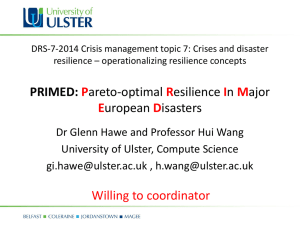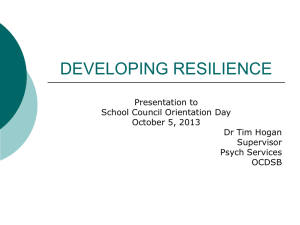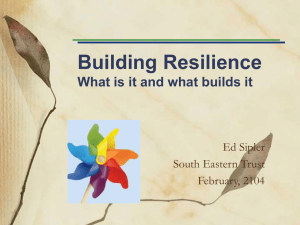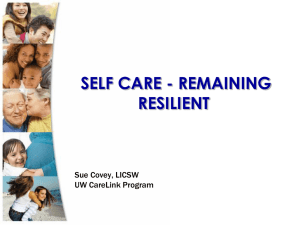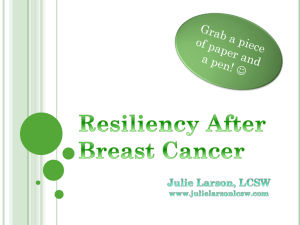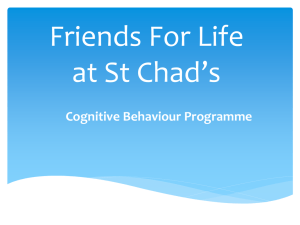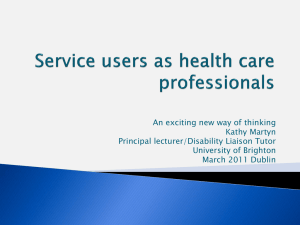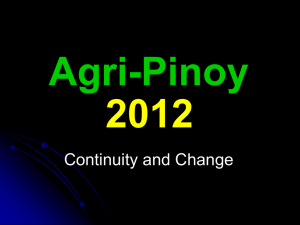Thriving not just Surviving- Enhancing resilience in Social Workers
advertisement
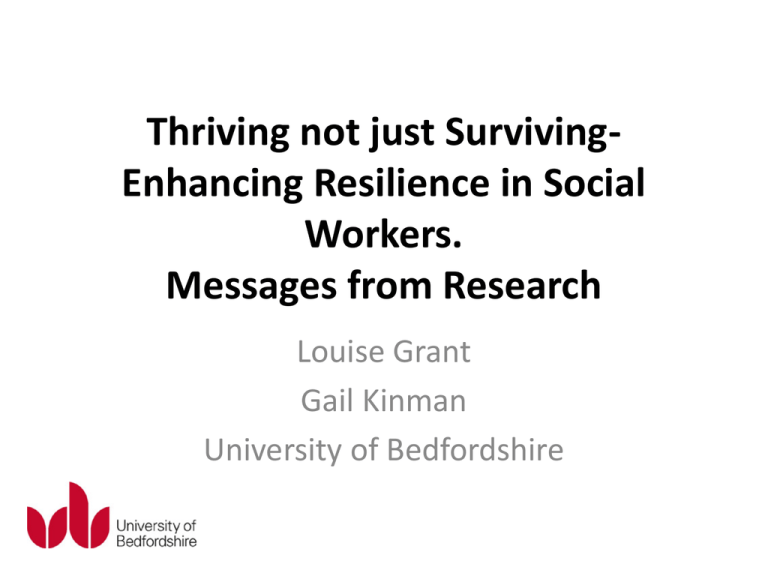
Thriving not just SurvivingEnhancing Resilience in Social Workers. Messages from Research Louise Grant Gail Kinman University of Bedfordshire Social work and stress • We know Social Work is satisfying, but we also know that it is stressful • Evidence is that Stress is related to poor psychological and physical health, and leads to illness, absence and impaired performance in Social Workers • Stress has been identified as a particular problem for trainees and newly qualified Social Workers, an issue frequently raised by Social Work Managers • But some Social Workers are more resilient to stress than others, the question is why? And how do we improve there resilience? (e.g. Coffey et al., 2009; Eborall & Garmeston, 2001; Lloyd et al., 2002) The importance of resilience to wellbeing and professional practice “Social workers need to develop the emotional resilience to manage the challenges they will face” (Laming, 2009) “A key resource in social workers? May predict successful coping” (Collins, 2008) “The most troubling and intractable situations exist when performance difficulties occur in the context of staff who lack accurate empathy, self awareness and self management skills” (Morrison, 2007) What is Resilience and why do some people bounce back “The general capacity for flexible and resourceful adaptation to external and internal stressors” - (Klohen, 1996) “Psychological resilience refers to effective coping and adaptation although faced with loss hardship or adversity” – (Tugrade and Frederikson 2004) “What might enable some workers to persist, endure and thrive in their careers, compared to others who may become ill and sometimes eventually leave the profession?” - (Collins 2007) Resilience: building the foundations • Q. What are the individual factors that underlie resilience, successful coping and wellbeing? • A. Our view is: – Emotional intelligence, self awareness gained via personal reflection and effective social support mechanisms • enhance resilience to stress • foster wellbeing • are key qualities for social workers “who fly” Emotional intelligence, reflective ability and associated competencies • Emotional intelligence – Evaluation and expression of emotion; emotional regulation; the use of emotions in decision making – Inter- and intra-personal aspects • Reflective ability – Self reflection, empathetic reflection and reflective communication • Empathy ₋ Perspective taking, empathetic concern and empathetic distress • Social competence Aims and objectives of research: • To develop interventions to enhance resilience and wellbeing in social work students and social workers • To gain insight into students’ understanding of resilience and why it is important • To examine emotional intelligence, reflective ability and associated competencies as predictors of resilience and wellbeing • To explore ways in which reflective practice might enhance resilience What we did • Content analysis of data that examines: – what is resilience and why is it important for social workers? • Cross-sectional questionnaire study – to examine emotional intelligence, reflective ability and associated competencies as predictors of resilience and wellbeing • An examination of student perceptions and experiences during placements is underway – Semi structured interviews – Reflective accounts Predictors of resilience and wellbeing Sample – 240 social work students (69% L1, 31% L2) – 82% female, age range 19 – 53; 78% UK nationals Measures – Emotional intelligence (Schutte et al., 1997) – Reflective ability (Aukes et al., 2007) – Empathy: 3 dimensions (perspective taking, empathetic concern, personal distress) (Davis, 1983) – Social competence (Sarason et al., 1984) – Resilience (Wagnild & Young, 1993) – Psychological distress (Goldberg & Williams, 1987) Our research found • 43% of trainee and newly qualified social workers achieved scores indicative of “caseness” levels of psychological distress • Social work students were more resilient and less distressed if they: – were more emotionally intelligent (p<.001) – had stronger reflective abilities across all domains (p<.001), especially empathetic reflection – were more socially competent (p<.01) – had more empathetic concern, but less empathetic distress (p<.01 and p<.001) • High empathy= positive, but high empathy without empathetic reflection = negative So this means that • Those who are more emotionally intelligent are more resilient to stress which, in turn, impacts on wellbeing Emotional intelligence Resilience Full mediation demonstrated Psychological health (from r = -.29, p<.001 to r = .07, non sign.) Physical health (from r = -.19, p<.01 to r = -.10, non sign.) Psychological and physical health How can knowledge gained be applied to support social workers? • Reflection in supervision is important as a self protective mechanism • Supervision should have a more explicit focus on emotion management as enhancing emotional intelligence can aid resilience • Social Workers should have help in identifying different stress coping strategies-. – (for students we are running Wellbeing Days – encompassing cognitive, social support, relaxation and practical skills) Resilient Social Workers Key features of resilient social workers are those who are and are supported to be:• Confident • Optimistic • Reflective and looking to improve • To achieve goals So Keep on going, be proud of your achievements and celebrate your success

